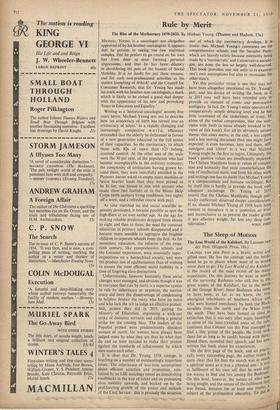Rule by Merit
The Rise of the Meritocracy 1870-2033. By Michael Young. (Thames and Hudson, 15s.) MICHAEL YOUNG is a sociologist not altogether approved of by his brother-sociologists. It appears
that he persists in taking too few statistical samples, that he prefers to go round on his own feet from door to door forming personal
impressions, and that he has been dilatory in shouldering his pole of the banner of Social Mobility. It is no doubt for just these reasons, and for such non-professional activities as his sudden launching of Which? and the Council for Consumer Research, that Dr. Young has made his mark ,with his brother-non-sociologists, a mark which is likely to be etched a good deal deeper with the appearance of his new and provoking 'Essay in Education and Equality.'
Writing as a `historical sociologist' seventy-five years hence, Michael Young sets out to describe how `an aristocracy of birth has turned into an aristocracy of talent.' In a rapidly changing and increasingly competitive w o r 1 d, efficiency demanded that the elderly be dethroned in favour of a new generation educated to the full extent of their capacities. So the meritocracy, to which those with IQs of more than 125 belong, assumed control. At the other end of the scale were the 30 per cent. of the population who had become unemployable in the ordinary economy; the complexity of civilisation having grown be- yond them, they were mercifully enrolled in the Pioneers (never asked to empty more dustbins or heave heavier loads than they were proved to be fit for, nor forced to mix with anyone who made them feel foolish) or in the Home Help Corps (with sanitary living conditions, two nights off a week, and a refresher course with pay).
As time marched on and social scientific in- genuity developed, it became possible to spot the high-fliers at an ever earlier age. As the age for making reliable predictions dropped from eleven to eight and then to three, the need for common edtication in primary schools disappeared, and it became more sensible to segregate the brighter children in separate schools from the first. As for secondary education, the reforms of the twen- tieth century, like comprehensive schools and the Leicester experiment, were essentially super- impositions on a hierarchical society, nd were the product less of egalitarianism than of wishing to ensure the most efficient social mobility in a time of lingering class distinctions.
Unfortunately, however humanely these social changes were managed, and obvious though it was to everyone that rule by merit is a superior system to rule by inheritance or nepotism, the merito- cracy did have the disadvantage of condemning to helpless despair the many who have no merit and who lack the wit to lodge an effective protest. Still, protest they did in 2033, gutting the Ministry of Education, organising a walk-out strike of domestic servants and calling a general strike for the coming May. The leaders of the Populist protest were predominantly dissident women of merit; for 'women have always been judged more by what they are than by what they do and so were anxious to make their protest against the standards of achievement by which men assess each other.
It is clear that Dr. Young, 1958 vintage, is touching on a number of outstandingly important issues. The inheritance of war-time assumptions about efficient selection and promotion, rein- forced by an LSE sociology intent on demolishing roadblocks in the way of talent and on promoting class mobility upwards, and backed up by the proliferating growth of the power and outlook of the Civil Service: this is precisely the situation
out of which the meritocracy develops. It is ironic that Michael Young's comments on the comprehensive schools and the Socialist Party, which are heavily satiric because ostensibly being made by a `meritocratic' and Conservative sociolo- gist, are none the less so largely well-deserved. ' This book provokes one not only to re-examine one's own assumptions but also to reconsider the other man's.
Yet this particular virtue is one that may not have been altogether intentional on Dr. Young's part, and his device of writing the book as if in 2033 may well have been intended only In provide an element of ironic and provocative ambiguity. In fact, Dr. Young's satire operates at a comparatively simple debating level and he has little command of the undertones of irony, let alone of the verbal compression, that one asso- ciates with Swift (a name 'already invoked in re- views of this book). For all its obviously serious theme, this essay seems, in the end, a less cogent and a less moving document than one might have expected; it even becomes, here and there, self- indulgent and 'clever' in a way that Michael Young might be the first to regret. Ultimately, the book's positive values are insufficiently explored. The Chelsea Manifesto hints at values of compas- sion and humanity that must counterbalance the rule of intellectual merit, and from his other work and writings one has no doubt that Michael Young is a compassionate and humane sociologist. But by itself this is hardly to provide the book with adequate anchorage. Dr. Young of 2033 asserts that the Chelsea Manifesto, though null' tically ineffectual, deserved deeper consideration. If so, should Michael Young of 1958 have been content to introduce it in a quotation so brief and inconclusive as to prevent the reader giving it any effective weight, far less any deep con-














































































 Previous page
Previous page